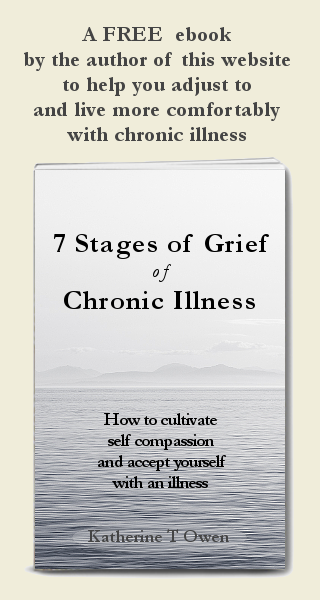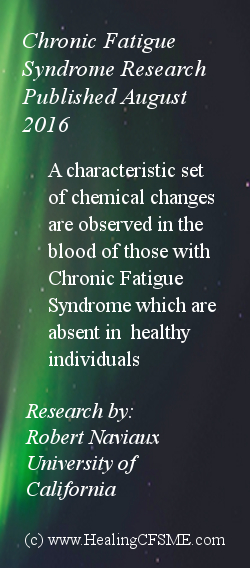Research into the illness ME -
Myalgic Encephalomyelitis
This is one of several articles in which I share research into the illness ME ( Myalgic Encephalomyelitis also known as Chronic Fatigue Syndrome).
The articles below are likely to be of interest mainly to those with the auto-immune illnesses such as CFS, Myalgic Encephalomyelitis, CFIDs, SEID, Fibromyalgia and Post Viral Fatigue.
Or click here to CHOOSE FROM
A RANGE OF personalizable cards and gifts.
The healing-themed gifts are designed by myself, Katherine, the author of
this website HealingCFSME.com
Proceeds go towards the cost of the website. Thank you. Enjoy!
This CFS/ME article shares research from the years 2013 to 2016.
Click here for a full list of CFS/ME research articles on this website.
If you wish to add your own news related to the illness ME or Chronic Fatigue Syndrome please feel free to share your wisdom and experience on the healing forum.
Contents for Research Related to the Illness ME
If there is no link for the research of interest to you, please click on the link for the year and then scroll down.
"Taking these plant derived minerals has been accompanied by a significant improvement in my health.
They are my top recommendation on this website."
Katherine T Owen, webmaster at HealingCFSME.com
- Energy metabolism in chronic fatigue syndrome patients. Is the body acting as though it is starving?
- Amino acid research on people with Chronic Fatigue Syndrome
- Japanese research finds a test to differentiate between normal fatigue and pathological fatigue.
- Possible blood test for Chronic Fatigue Syndrome - Are people with CFS in hibernation?!
- Higher levels of cytokines in those with CFS/ME in the first 3 years
- USA initiative to rename the illness Chronic Fatigue Syndrome to bring greater recognition of this serious chronic illness.
- Chronic mycoplasma infection found in 50% of CFS patients
The relaxation response can improve mitochondrial function
Research into the illness ME in 2016
Research into the illness ME, Myalgic Encephalomyelitis, December 2016
Oxidative stress pathways and Energy metabolism in chronic fatigue syndrome patients -
Amino acid and fatty acid research
When was the research published:
December 2016
Who:
Chris Armstrong, a researcher. Bio 21 research group director Associate Professor Paul Gooley. Clinician, Dr Donald Lewis. Dr Neil McGregor, former editor of the Journal of Chronic Fatigue Syndrome, and Dr Henry Butt, director of medical laboratory Bioscreen.
Where:
University of Melbourne’s Bio21 Molecular Science and Biotechnology Institute and the Department of Biochemistry and Molecular Biology, Australia
What:
Research into metabolites and microbiota in faeces, blood and urine with ME/CFS. Urine, blood and faecal samples were taken (after overnight fasting) from 34 women diagnosed with ME and from 25 people in a control group without the illness.
How:
Magnetic resonance spectrometry was used to investigate differences in the energy metabolism of people with ME/CFS.
Finding:
The research suggests that the composition of the good gut bacteria versus bad gut bacteria in people with CFS/ME could be shifting the body away from obtaining energy from glucose to obtaining energy instead from fats and proteins.
Amino acid levels in patients with CFS/ME differ from those in the control group.
Conclusion
A similar process takes place in the body when it is starving. It may be a possible explanation for the lack of energy people have in ME/CFS.
Chris Armstrong is quoted as saying: “When people are facing starvation, the body uses amino acids and fatty acids to fuel energy for most cells in the body, to keep glucose levels vital for the brain and muscles as high as possible.”
More research is needed to confirm and extend these results.
Read the chronic fatigue syndrome research findings here.
Katherine (author of HealingCFSME.com) comments:
This research is of interest to me as I have been taking an amino acid supplement for Chronic Fatigue Syndrome for most of the last year. I have improved in that time - muscle use and energy production, and am now rarely aware of hypoglycemic symptoms, and am able to eat less often.
Other factors may of course be involved, but perhaps the amino acid supplement is working for me.
Research into the illness ME, Myalgic Encephalomyelitis, August 2016
Possible test for Chronic Fatigue Syndrome
When:
August 2016
Who and Where:
Japan. Ryo Aoki et al.
Research result:
Japanese research finds a test to differentiate between normal fatigue (someone recovers after rest) and pathological fatigue. The researchers measured salivary human herpesvirus HHV-6 and HHV-7. These responded differently in the different groups of test participants.
How can I find out more:
Click through here to read the ME Australian website.
Research into the illness ME, Myalgic Encephalomyelitis, August 2016
Possible blood test
for Chronic Fatigue Syndrome -
CFS and hibernation. Metabolomics ME.
Research by:
Robert Naviaux University of California, San Diego CFS, published 29 August 2016. This study is in the new field of metabolomics.
Methodology:
Blood samples were analysed from 45 people with Chronic
Fatigue Syndrome and 39 healthy individuals of the same age.
Research findings:
A characteristic set of chemical changes were observed in
the blood of those with Chronic Fatigue Syndrome which were absent in the healthy
individuals.
Key chemicals in the body were often present in lower levels than normal.
Possible diagnostic marker:
The blood test designed by Dr R K Naviaux is over 90 per
accurate in identifying people with CFS.
Possible cause of Chronic Fatigue Syndrome:
Robert Naviaux the scientist leading the research said something similar
happens when animals dial down their metabolism to hibernate.
He surmised that in CFS, the body may get stuck in this state of hibernation and that pain and disability may result as a consequence.
Other comment:
Dr Naviaux said: ‘CFS is a very challenging disease. It
affects multiple systems of the body. Symptoms vary and are common to many
other diseases.’
He hopes his work will lead to new treatments, as well as providing patients
with a quicker route to diagnosis.
Click the following link to read more about this CFS research in the online science journal: Proceedings of the National Academy of Sciences
Research into the illness ME, Myalgic Encephalomyelitis, in 2015
Neuroinflammation and ME Cfs, Dr. Lucinda Bateman, USA
With grateful thanks to the Dutch youtube channel, Wetenschap voor Patienten
@Wetenschap-MEcvsVer
Look them up for further related videos.
0.24 Have neuroimflammations been shown in ME/cfs?
1.18 Which part of the nervous system is affected as usual?
2.00 Neuroimflammations in ME/cfs: cause or consequence of other symptoms?
3.13 Are there treatments for neuroinflammation in ME/cfs?
4.04 What effect do antivirals have?
Research into the illness ME, Myalgic Encephalomyelitis, February 2015
Higher levels of cytokines in those with CFS/ME in the first 3 years
What did they find?
The research showed specific patterns of immune molecules in patients who had CFS/ME for up to three years.
The CFS/ME patients who had had the disease for up to three years had higher levels of cytokines, particularly one called interferon gamma. Interferon gamma has been linked to the fatigue that follows many viral infections.
Healthy patients did not show the same pattern. Nor did those who had experienced the disease for longer than three years.
Possible conclusions and implications:
There are distinct stages to the disease CFS/ME.
In a BBC News article, Dr Charles Shepherd is quoted as saying that, if replicated, the results
"could be used to aid diagnosis and open the door to the use of
anti-inflammatory drug treatments that would dampen down the abnormal
immune system response".
Sample size? They tested blood samples from nearly 300 ME patients and 350 healthy volunteers.
Who: A US research team
Published where: The online journal of Science Advances. Main author, Dr Mady Hornig.
Other: Further experimentation is needed to confirm these results.
Comment by Katherine T Owen: I am not clear if there is an implication that the disease lessens after a three year period, corresponding with the drop in cytokines. I can say that sadly this is not my experience, or the experience of many other people I know living with CFS/ME.
Research into the illness ME, Myalgic Encephalomyelitis, February 2015
USA initiative to rename the illness Chronic Fatigue
Syndrome to bring greater recognition of this serious chronic illness
From: the Institute of Medicine, a prestigious government advisory group in the U.S. (IOM)
Proposal: The illness CFS should be renamed Systemic Exertion Intolerance Disease, or SEID, to reflect that symptoms are worse after exertion.
Proposal: 3 core symptoms should be required to diagnose SEID along with 1 symptom out of cognitive impairment and orthostatic intolerance.
Click through to read more about these criteria and others for diagnosing CFS/ME.
Read the article or, if time has passed, visit IOM's website www.iom.edu where they plan to post a
guide for doctors.
Research into the illness ME, Myalgic Encephalomyelitis, in 2014
Research into the illness ME, Myalgic Encephalomyelitis, October 2014
Chronic mycoplasma infection is present in 50% of CFS patients
It has been found that chronic mycoplasma infection is present in 50% of CFS patients. Of those for whom this is true most recover after long-term antibiotic therapy.
Source of information:
Department of Rheumatology, The National Hospital, University of Oslo,
Norway.
This isn't NEW CFS news as the post on http://niceguidelines.blogspot.co.uk is dated June 2011, but it is news to me.
A viral cause for CFS is most commonly suggested, but every now and again, someone suggests a bacterial cause instead.
I have certainly heard of someone who recovered significantly from Myalgic Encephalomyelitis on longterm antibiotics.
For myself, I was put on antibiotics this year for several weeks and my ME/CFS symptoms were worse as a result.
As always, it is early days my friends in terms of finding a cause and treatment for CFS.
Research into the illness ME, Myalgic Encephalomyelitis, in 2013
Research into the illness ME, Myalgic Encephalomyelitis 2013
The relaxation response can improve mitochondrial function
This study dealt with healthy subjects and not those living with chronic illness. Nevertheless, I am keen to include it here in Research into the illness ME.
A study of 26 healthy adults undertook an 8-week training course in learning to activate the relaxation-response which is the opposite of the stress response.
Blood samples taken before and after the course were analyzed.
Research findings:
Pathways involved with energy metabolism, including mitochondrial function, were upregulated.
Low mitochondrial function is often implicated in those with Chronic Fatigue Syndrome.
Pathways were suppressed that are known to contribute to stress, trauma and cancer.
Research by:
The Benson-Henry Institute for Mind/Body Medicine at Massachusetts General Hospital and Beth Israel Deaconess Medical Center
Read more on the Harvard website.
Katherine's comments:
This study encourages me to take my relaxation sessions more seriously and carry them out with more consistency. Isn't it amazing that the research shows so clearly that we can change our genes - effectively turning them up or down?
Click through for a separate page of articles on research into CFS and exercise.
Or click through on the link below to the full list of Research into Chronic Fatigue Syndrome and the illness ME on this website.
- Home Page
- CFS/ME News
- Illness Me
Receive daily inspiration...
by putting your favorite (favourite) healing quote on
a mug, cushion, postcard, coaster, T shirt etc.
You will find my zazzle gift store at
zazzle.com/HealingStore.
Use one of my designs or start from a blank.
Thank you from me, Katherine, author of HealingCFSME.com
 |
© Katherine T Owen. All articles on this website are copyrighted. I am delighted if you choose to click above to share this page on social media, but please
do not copy, print or otherwise use without my permission. Thank you. Disclaimer:
I am not a medical practitioner. The articles on this website are not
to be taken as medical advice. Please consult a medical practitioner as
necessary. |














